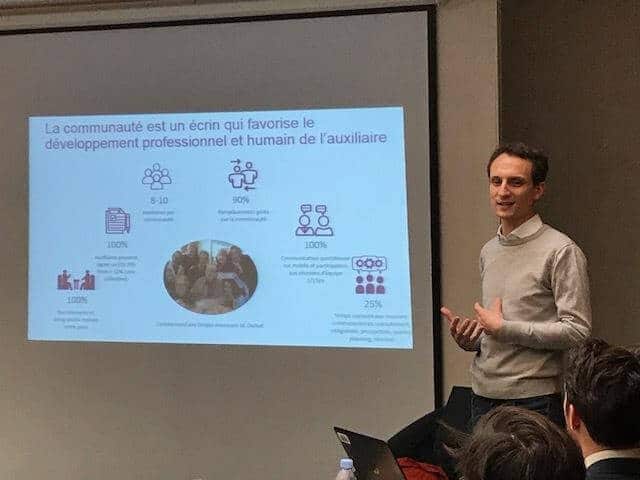News
Presentation by Clément Saint Olive (Alenvi) on the liberated companyAs part of its internal training day on March 29, 2018, Pagamon was fortunate and pleased to welcome Clément Saint Olive, co-founder of the company Alenvi for a speech on the theme of the liberated company, applied to the particular case of Alenvi.
The speaker: Clément Saint Olive.
Originally from the Nord region, near Lille, Clément Saint Olive was trained at HEC (2005) and spent 3 years at Sodexo, then 6 years in the concierge subsidiary Circles in France, then in the UK, then in the European management; in 2016, he embarked on the Alenvi entrepreneurial adventure with 2 classmates, Thibault de Saint Blancard and Guillaume Desnoes.
The company: Alenvi.
Alenvi is a home help service company, which has deliberately chosen to put people at the heart of its system. It puts in contact with life assistants – renamed Desire assistants – and elderly people – often their families – who need assistance or support at home; cooking, washing, companionship, etc. the support ranges from a few hours a week to 24 hours a day for very dependent people or Alzheimer patients. It thus allows for home care and thus a gentle alternative to a transfer to a retirement home.

The breakthrough concept: the liberated company.
Alenvi was built on the principles of the liberated company: self-determination and self-organization, to reconnect with employee motivation and enable the creation of value. In this context, it is necessary to start from the principle that it is the one who “does” who “knows” with a real desire to put the human being at the heart of the organization. This type of company gives itself the right to return to learning by doing, and the manager becomes a coach at the service of the teams.
Some of the key operating principles of a liberated company:
- Provide access to a rewarding work environment for autonomous communities of envy helpers.
- Extend organic development.
- Ensure humane and supportive care for seniors.
- Consider the community as a setting that promotes the professional and human development of the caregiver.
- 100% of recruitments and integrations are done among peers.
- 90% of replacements are managed by the community.
- Use technology (Pigi mobile virtual assistant developed in-house) that empowers caregivers and reduces administrative costs.
According to the Anact (National Agency for the Improvement of Working Conditions), the main ingredients of the liberated company are…
- The ability of managers to listen.
- The freedom of employees, a driving force for motivation and creativity.
- Shared values and a commitment by all to the corporate culture.
- The disappearance of pyramidal hierarchy and control.
- The disappearance of symbols of privilege.
- The disappearance of imposed schedules.
- The principle of subsidiarity: employees have the right to make decisions about what concerns them.
- Employees who care about the customer, their company and their colleagues.
In France, the movement is led by Isaac Getz; examples of liberated companies are multiplying, based on existing cases such as Gore (inventor of Gore-Tex in the USA), FAVI (automotive equipment manufacturer in Picardy) or Poult (cookie factory in Montauban).
However, it was a Dutch company, Buurtzorg, that strongly inspired the co-founders of Alenvi. This company, founded in 2007 by Jos de Blok, with a team of 4 nurses and whose name can be translated into French as “neighbourhood care”, has created a new model for home nursing in the Netherlands, based on the liberated enterprise. Today, the company has 15,000 homecare workers and a turnover of more than 300 million euros. A study conducted by KPMG in 2010 concluded that Buurtzorg was able to reduce the cost of assistance and care per person cared for by 40%. In 2011 and 2012, Buurtzorg was voted “best employer of the year” in the Netherlands. Finally, the company is ranked No. 1 in customer satisfaction surveys among more than 300 care organizations.
To go further:
- Interview with Clément Saint Olive, co-Founder of Alenvi on CNews : https://www.youtube.com/watch?v=3yZv_F6icYM.
- Interview with Guillaume Desnoes, co-founder of Alenvi, on Europe 1 by Maxime Switek : https://www.youtube.com/watch?v=c7tEjBkwfY0.
- Conference by Frédéric Laloux, author of “Reinventing organizations” and specialist of the Buurtzorg case : https://www.youtube.com/watch?v=NZKqPoQiaDE.
- Lecture by Isaac Getz: https://www.youtube.com/watch?v=9oZUMzQDaw8.
- Conference by Jos de Blok, “Humanity above bureaucracy” : https://www.youtube.com/watch?v=BeOrNjwHw58.
Pagamon is a strategy and transformation consulting firm founded in 2013. We support major players in the industry, services and life sciences sectors in their search for balance. Helping them structure their strategic vision, transform their operational and/or digital model, and drive change. To support profitable, sustainable and responsible growth. As a committed player, Pagamon leads the Observatory of the Balanced Organization™, articulated around a "think tank" and an annual survey. In order to provide an innovative, sometimes offbeat, perspective on the strategic and operational implementation of transformations to support the growth of companies.
